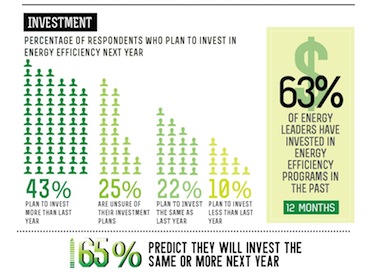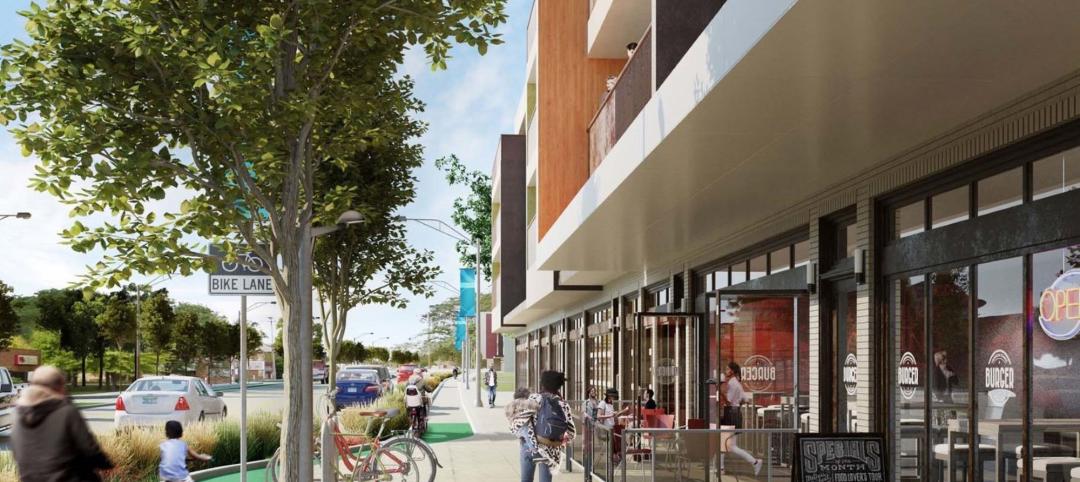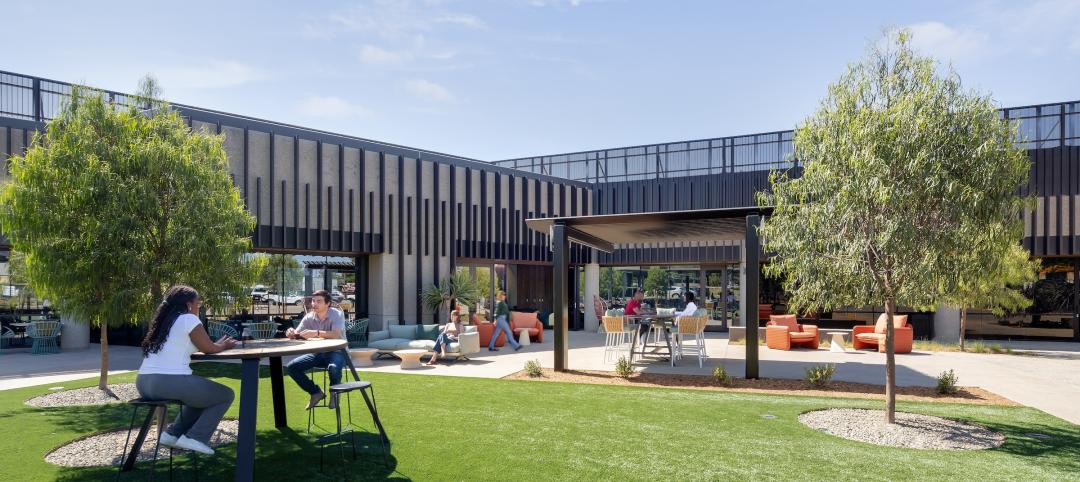Forty-three percent of energy leaders say their investment in energy efficiency next year is projected to be more than it was last year, according to survey results released today by Schneider Electric. Twenty-two percent said their projected investment would stay the same, and 10 percent reported their investment would be less than last year.
The survey, conducted in June at Schneider Electric’s Xperience Efficiency events in Washington, D.C. and Dallas, includes responses from 369 leaders in energy efficiency from business and government sectors and was intended to provide insight into the future of energy efficiency and challenges organizations face.
“Energy efficiency is the first and best fuel source we have to meet our nation’s growing energy demands and use our energy more effectively,” said Chris Curtis, President and CEO, North America Operations, Schneider Electric. “It’s good for job creation and the environment, and allows companies to cut costs along with their consumption. With the majority of respondents reporting energy efficiency investments to be the same or more than last year, it’s clear that the benefits of energy efficiency are speaking for themselves.”
Sixty-four percent of respondents reported energy cost savings as the biggest driver impacting energy management investment decisions. Government incentives came in second with 10 percent, followed by government policies and industry standards with 8 percent, executive mandate with 6 percent and brand image with 5 percent.
The majority of respondents, 63 percent, reported they had invested in energy efficiency programs in the past 12 months. Specifically, the two most common energy management practices that respondents’ organizations have adopted in the past 12 months were tracking and analyzing data (29 percent) and energy audits (also 29 percent).
The respondents also shared their thoughts on which energy management approaches will take hold in the next five years, predicting that building automation (24 percent), efficient lighting (21 percent) and data center efficiency (16 percent) would become the most popular.
Other significant survey findings include:
· 41 percent of respondents cited tax credits or incentives as the energy policy that has had the greatest impact on improving energy efficiency in their organization.
· 60 percent of respondents said that they have someone in their organization responsible for energy management.
“While these results show good progress, we have a significant opportunity to do more,” concluded Curtis. “The U.S. currently ranks ninth in energy efficiency among the largest global economies, according to the American Council for an Energy-Efficient Economy. This is unacceptable. We have many opportunities right now -- practical, tangible actions any business, government or homeowner can take -- to improve efficiency with a quick return on investment and immediate results.”
Xperience Efficiency 2013 took place in the Washington D.C. area from June 4-6 and Dallas, Texas from June 18-20. A free event, it brought together customers, partners and governments to collaborate and share knowledge on how to solve energy and sustainability challenges. The event focused on the latest integrated energy and sustainability trends, and solutions that deliver energy management, energy access, and business process performance answers across the energy value chain -- impacting the future of efficiency at home, at work, across the grid and in towns and cities.
To learn more about Schneider Electric’s thought leadership in energy management and energy efficiency, visit http://www.schneider-electric.
Methodology
This survey was commissioned by Schneider Electric between June 4, 2013 and June 20, 2013 to gather feedback on energy management and energy efficiency in the North America region. It was taken by 369 people at Schneider Electric’s Xperience Efficiency events, specifically 204 people in Washington, D.C. and 165 people in Dallas. The survey included 9 multiple choice questions. Responses have been analyzed by Global Resource Optimization (GRO) in association with Text100.
About Schneider Electric
As a global specialist in energy management with operations in more than 100 countries, SchneiderElectric offers integrated solutions across multiple market segments, including leadership positions in Utilities & Infrastructure, Industries & Machines Manufacturers, Non-residential Building, Data Centers & Networks and in Residential. Focused on making energy safe, reliable, efficient, productive and green, the company's 140,000 plus employees achieved sales of 30.8 billion US dollars (24 billion euros) in 2012, through an active commitment to help individuals and organizations make the most of their energy.
Related Stories
MFPRO+ New Projects | Oct 30, 2024
BIG’s One High Line finally reaches completion in New York City’s West Chelsea neighborhood
One High Line, a luxury residential project spanning a full city block in New York’s West Chelsea neighborhood, reached completion this summer following years of delays related to investor lawsuits.
Urban Planning | Oct 30, 2024
Bridging the gap: How early architect involvement can revolutionize a city’s capital improvement plans
Capital Improvement Plans (CIPs) typically span three to five years and outline future city projects and their costs. While they set the stage, the design and construction of these projects often extend beyond the CIP window, leading to a disconnect between the initial budget and evolving project scope. This can result in financial shortfalls, forcing cities to cut back on critical project features.
MFPRO+ New Projects | Oct 30, 2024
Luxury waterfront tower in Brooklyn features East River and Manhattan skyline views
Leasing recently began for The Dupont, a 41-story luxury rental property along the Brooklyn, N.Y., waterfront. Located within the 22-acre Greenpoint Landing, where it overlooks the newly constructed Newtown Barge Park, the high-rise features East River and Manhattan skyline views along with 20,000 sf of indoor and outdoor communal space.
Libraries | Oct 30, 2024
Reasons to reinvent the Midcentury academic library
DLR Group's Interior Design Leader Gretchen Holy, Assoc. IIDA, shares the idea that a designer's responsibility to embrace a library’s history, respect its past, and create an environment that will serve student populations for the next 100 years.
Resiliency | Oct 29, 2024
Climate change degrades buildings slowly but steadily
While natural disasters such as hurricanes and wildfires can destroy buildings in minutes, other factors exacerbated by climate change degrade buildings more slowly but still cause costly damage.
Office Buildings | Oct 29, 2024
Editorial call for Office Building project case studies
BD+C editors are looking to feature a roundup of office building projects for 2024, including office-to-residential conversions. Deadline for submission: December 6, 2024.
Healthcare Facilities | Oct 28, 2024
New surgical tower is largest addition to UNC Health campus in Chapel Hill
Construction on UNC Health’s North Carolina Surgical Hospital, the largest addition to the Chapel Hill campus since it was built in 1952, was recently completed. The seven-story, 375,000-sf structure houses 26 operating rooms, four of which are hybrid size to accommodate additional equipment and technology for newly developed procedures.
Multifamily Housing | Oct 28, 2024
A case for mid-rise: How multifamily housing can reshape our cities
Often referred to as “five-over-ones,” the mid-rise apartment type is typically comprised of five stories of apartments on top of a concrete “podium” of ground-floor retail. The main criticism of the “five-over-one” is that they are often too predictable.
Sports and Recreational Facilities | Oct 24, 2024
Stadium renovation plans unveiled for Boston’s National Women’s Soccer League
A city-owned 75-year-old stadium in Boston’s historic Franklin Park will be renovated for a new National Women’s Soccer League team. The park, designed by Fredrick Law Olmsted in the 1880s, is the home of White Stadium, which was built in 1949 and has since fallen into disrepair.
Laboratories | Oct 23, 2024
From sterile to stimulating: The rise of community-centric life sciences campuses
To distinguish their life sciences campuses, developers are partnering with architectural and design firms to reimagine life sciences facilities as vibrant, welcoming destinations. By emphasizing four key elements—wellness, collaboration, biophilic design, and community integration—they are setting their properties apart.

















